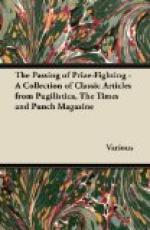Defendant, who admitted negligence, pleaded poverty and threw himself upon the mercy of the Court.
The Bench, in summing up, called the jury’s attention to the fact that defendant was not a labourer, but only a professional man; at the same time he reminded them of the impartiality of British justice, which did not admit that there was one law for the rich and another for the poor. Even the wealthiest labouring-man must be protected in the exercise of his inalienable right to work.
The accompanying photograph shows the plaintiff in the act of assisting to build a wall.; He is a self-made man, having started life as a solicitor and by sheer perseverance raised himself to the lucrative and responsible’ position of an unskilled bricklayer’s labourer.
* * * * *
TO M. GEORGES CLEMENCEAU.
Strong son of France, whose words were
ever lit
By lightning flashes of ironic wit;
More fond of power than of pelf or place,
Eternal foeman of the mean and base,
And always ready in a righteous cause
To suffer odium and contemn applause—
Men call you still the “tiger,”
but the name
Has long outworn the faintest hint of
blame,
Since in your country’s direst hour
of need
You have revealed your true heroic breed;
A tiger—yes, to enemies and
Huns,
But trusted, idolised, by France’s
sons.
So when of late a traitor’s felon
blow
Was like to lay you, old and ailing, low,
And France was sorely stricken in her
Chief,
The wide world shared her anguish—and
relief;
For the assassin, resolute to kill,
Was foiled by your indomitable will.
Immortal France! she cannot spare you
yet,
Till you have paid in full your filial
debt,
And by the great Redemption and Release
Stamped Victory with the final seal of
Peace.
* * * * *
[Illustration: CINDERELLA.
(No representative of the General Public seems to have been invited to sit on the Coal Industry Commission.)]
* * * * *
ESSENCE OF PARLIAMENT.
Monday, February 24th.—The mantle of the lamented Mr. JOSEPH KING, whose taste in proteges was so remarkable, seems to have descended upon Colonel WEDGWOOD. His request for the return to this country of LAJPAT RAI, “the Indian patriot,” aroused a storm of objection from other hon. Members, who considered the description inapplicable to a person deported for sedition. But it was quickly quelled by the SPEAKER with the unanswerable assertion that “everybody calls himself a patriot in these days.”
Mr. RAPER sought an assurance that no “wrack”—which appears to be a term of art in the timber trade—should be used in the houses to be erected under the Government’s new housing scheme. If these were not to be “the unsubstantial fabric of a vision,” he implied, the official builders had better leave the wrack behind.




